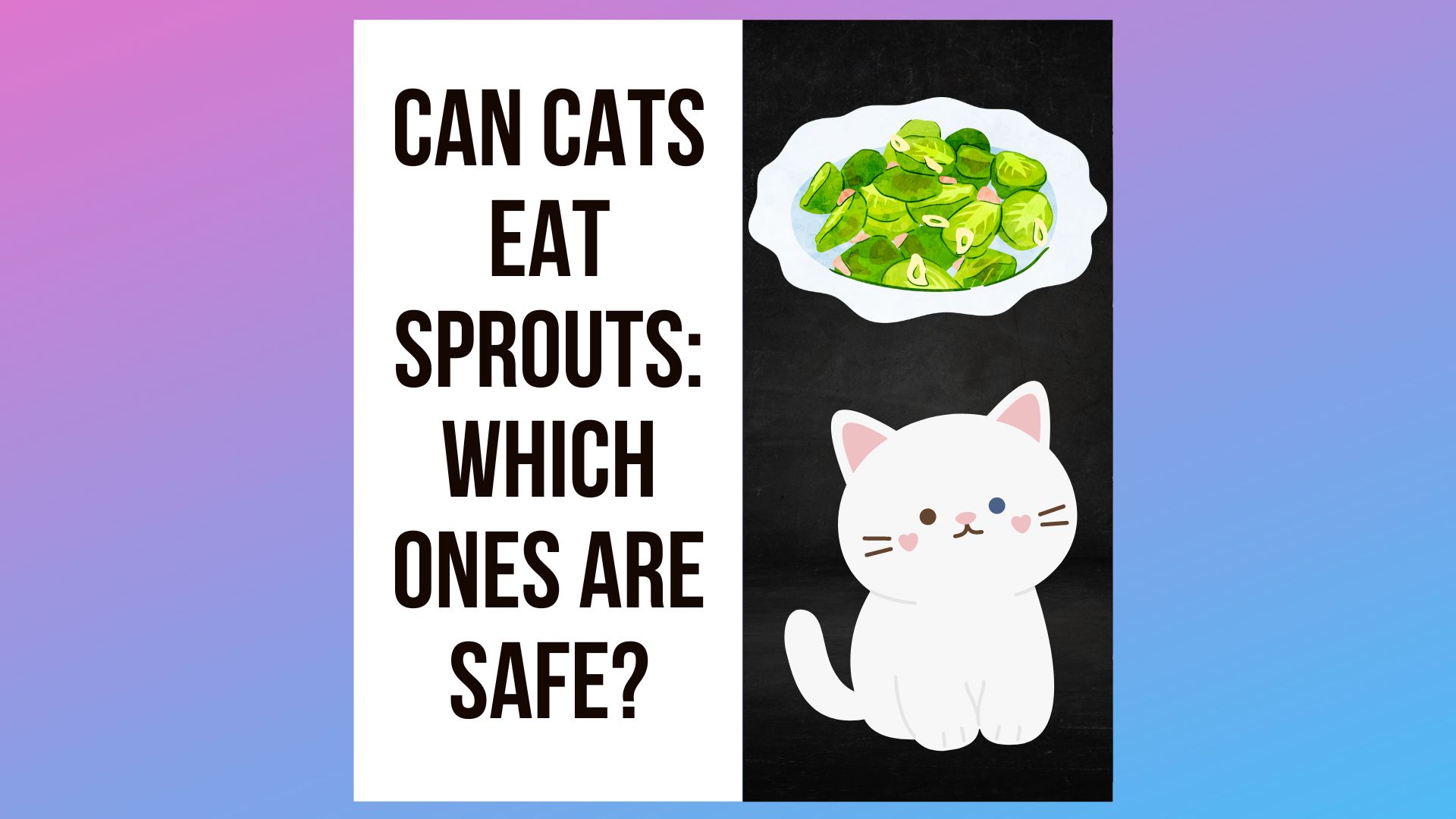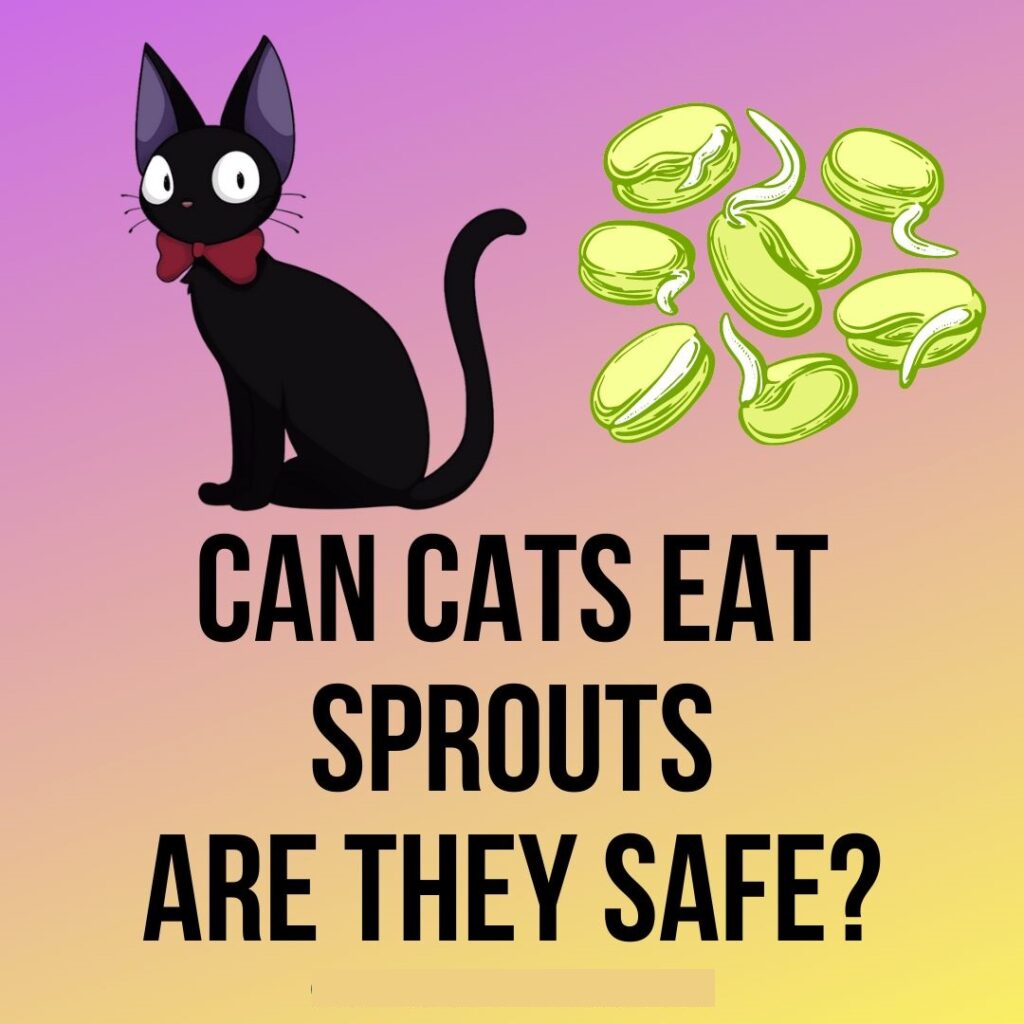
The Obvious Question is, Can cats eat sprouts? Is Sprout Safe For felines? Well, Cats are carnivorous animals. However, they can gain from munching on vegetables. In the wild, they might probably chew grasses and sprouts to complement their meat-centric diets.
The roughage enables cleaning out their digestive system and might offer minerals, vitamins, antioxidants, and enzymes, among different vital nutrients that felines require to thrive.
In fact, felines enjoy chewing on all sorts of distinct vegetables. Therefore, many cat proprietors seize their felines chewing on their houseplants.
Some houseplants are poisonous to cats. Hence, we need to be cautious about what our furry pals have access to. Therefore, it is ok to provide them with vegetables and sprouts which you understand will not damage them. Bean sprouts are a super choice for cats.
Are Sprouts Toxic To Cats?
The biggest challenge you ought to have with giving felines bean sprouts is contamination. Bean sprouts grow in moist, heat environments wherein it is easy for microorganisms to thrive. Raw sprouts particularly have been related to numerous foodborne contamination outbreaks.
Therefore, there are approaches to sanitize the sprouts and reduce the probabilities of contamination. Hence, to do this, you have to cook the sprouts very well before giving them to your feline. If your feline does eat uncooked sprouts, you have to monitor them for any gastrointestinal issues and infections which include:
- Diarrhea
- Vomiting
- Fever
- Stomach pain
- Breathing difficulties
- Twitching
- Collapse
- Coma
- Depression
Which Sprouts Are Good For Cats?
Mung bean, pea, alfalfa, radish, broccoli, sunflower, and clover sprouts are just a few examples of sprouts you could feed your canine or cat.
All include nutritional fiber, vitamin A and C, protein, calcium, and iron. Instead of sprouting one type of seed in each jar, consider making up a mix.

What Vegetables Can Cats Eat?
Nobody desires to accidentally poison their feline because they did not do the right research earlier than feeding them something. Therefore, there are a few plants that felines would possibly enjoy munching on better than the ingredients that are on your plate. Let us study a number of the top choices amongst cat owners.
Cat Grass – Contrary to famous belief, cat grass and catnip aren’t the same. The actual name for cat grass is oat grass. These plants are grown to eat, although you should cut them short because the grains that grow while the plant matures are toxic.
Catnip – Catnip is an all-around favorite among cats. Although not every feline responds to it, there are numerous who cannot get sufficient of it. Catnip offers euphoria. Smelling, licking. and biting it makes cats act more mellow and calm.
Cat Thyme – Cat thyme is not similar to the thyme that we season our meals with. In fact, It has a robust odor and the same soothing results as catnip that our felines love.
Mint – Plants belonging to the mint family are famous for attracting felines. Hence, try growing spearmint, apple mint, peppermint, or lemon mint in a small pot and watch your feline rub against the plant for hours. However, make sure that they don’t consume it because it can dissatisfy their stomach.
What Veggies Are Toxic To Cats?
Though felines can eat some veggies, garlic, onions, leeks, shallots, scallions, and chives are particularly harmful to cats.
In fact, these veggies cause gastrointestinal problems and sometimes damage the red blood cells.
You must avoid feeding food items containing these veggies and herbs.
Can Cats Have Cooked Brussel Sprouts
Yes, Brussels sprouts are good for felines. However, they must be fed in moderation.
Aside from the truth that it is toxic-free, it is critical to be aware that Brussels sprouts might not be as secure as completely green veggies.
When it involves the cultivation of Brussels, there are sure risks involved. People cultivate the sprouts in a heated and humidified atmosphere.
The amount of moisture used during the development phase creates a great setting for bacterial sporulation.
Also, this can range from moderate to deadly. There is constantly the chance of meals-borne sickness while eating Brussels sprouts.
Therefore, it is important to monitor your felines’ health starting with sprout eating. You must deal with food poisoning as quickly as possible.
Are Lentil Sprouts Safe For Cats?
Lentils aren’t toxic or risky to felines. In fact, it is abnormal for the reason that all of us know that felines could survive on both meat and feline food. It is uncommon but not exceptional among cat enthusiasts.
In fact, many cat proprietors attempt to include veggies into their feline’s eating regimen to offer loads of protein and diet sources, and lentils are one among them.
In fact, it is not possible to predict what a certain cat will devour or refuse to devour. Some people might alternatively eat only meat and cat food, while others will eat lentils and other veggies.
However, forcing your feline to eat a vegan diet is never an excellent idea. The digestive system of a feline differs from ours in numerous ways.
Cats nonetheless require protein to live to tell the tale. Lentils are simply an awesome way for them to obtain carbs in addition to a few different vitamins in their eating regimen.
On the other hand, in case you assume your feline can live completely on lentils and veggies, you must first contact a vet.
- 7 Tips: How To Feed Cat Wet Food While Away?
- How to Make Tuna Water For Cats? 7 Steps Guide
- 5 Best Wet Cat Food For Weight Loss
Final words
While your feline won’t need vegetables to survive, there are a few that are considered safe for felines to eat every now and then. However, bean sprouts are excessive in vitamins, protein, and minerals, and they do make a great deal for felines as long as they are not infected with risky bacteria.
Remember that in case you do not cook the sprouts, you’ll have to search for signs of illness over the following couple of days.
Frequently asked questions
Can Cats Eat Brussels sprouts?
Brussels sprouts are a good source of Vitamin K and Vitamin C but many felines and canines are not interested in eating them. However, if these animals want a small chunk, then just ensure that the veggies are completely cooked. Also, make sure it is small enough for your feline to swallow without choking.
Can Cats Eat Mung Bean Sprouts?
Mung bean, broccoli, pea, sunflower, and clover sprouts are some of the examples of sprouts that you can feed to your feline and canine. In fact, all these sprouts contain protein, iron, vitamin A and C, dietary fiber, and calcium.
Are broccoli sprouts safe for cats?
While broccoli sprouts are not as tasty as other snacks, these sprouts are full of nutrients and are perfectly fine for felines. But, you must feed it in small quantities. However, it is not a good idea to make veggies a part of your feline’s diet.
What veggies are Toxic to Cats?
Garlic, scallions, shallots, and onions can damage your feline’s red blood cells. In fact, it can lead to anemia. Also, these foods are poisonous when your feline eats them in large quantities.
What vegetables can cats eat every day?
Vegetables like peas, chopped carrots, green beans, frozen corn, lettuce, broccoli, winter squash, pumpkin, and zucchini are good for felines. You must cook the veggies since cats cannot break down the plant cell walls.

Hi, This is Alexa, and I love cats. This Website is a Complete Journal about how to travel with a cat and other information about Cat Health, Cat Training, Cat Behavior, Cat Foods and more. I hope you find it useful.
